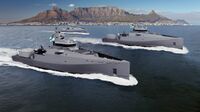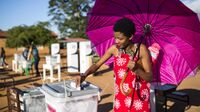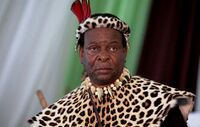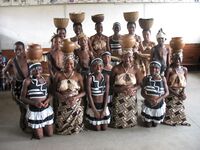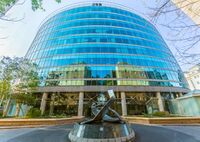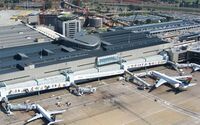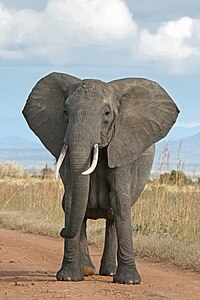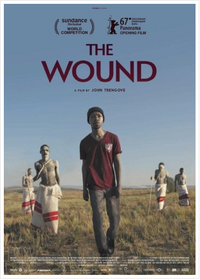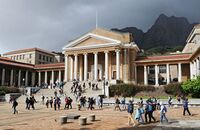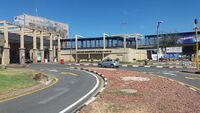Azania (country)
Republic of Azania | |
|---|---|
| Motto: Unity in diversity | |
| Anthem: God bless Africa
| |
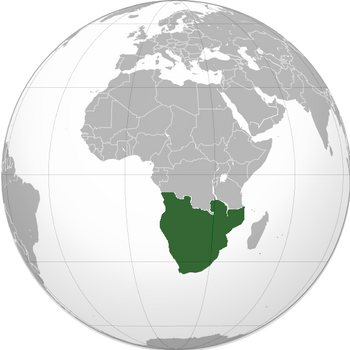 | |
| Capital | Tshwane |
| Largest largest city | Egoli |
| Official languages | English |
| Ethnic groups (2018) | Southern Bantu (60%), Khoisan (10%), White (10%), Mixed-race (10%), Indian (5%), Malay (3%) and other (2%) |
| Religion | Christianity (65%), Irreligious (20%), Islam (7%), African indigenous religions (5%), Judaism (1%), Hinduism (1%), Buddhism (1%) |
| Demonym(s) | Azanian |
| Government | Unitary constitutional presidential multi-party democratic republic |
| Legislature | Parliament of Azania |
| Formation | |
• Annexation of Portuguese Africa | 1750 |
• Amalgamation of British Southern African colonies | 1880 |
• Statute of Westminster | 1931 |
• Promulgation of the Constitution | 1960 |
| Area | |
• Total | 3,000,000 [convert: unknown unit] |
• Water (%) | Negligible |
| Population | |
• 2020 estimate | 100 million |
• Density | 33/km2 (85.5/sq mi) |
| GDP (PPP) | 2020 estimate |
• Total | $1.8 trillion |
• Per capita | $18,000 |
| GDP (nominal) | 2020 estimate |
• Total | $900 billion |
• Per capita | $9,000 |
| Gini (2016) | 36.9 medium |
| HDI (2020) | 0.740 high |
| Currency | Azanian pound (AZP) |
| Time zone | +2 UTC |
| Date format | dd-mm-yyyy |
| Driving side | right |
| Calling code | +27 |
| ISO 3166 code | AZ |
| Internet TLD | .az |
The Republic of Azania is an independent unitary Republic located in Southern Africa. It is surrounded by the Atlantic Ocean to the west, the Indian Ocean to the east, Madagascar to the east across the Musumbiki Channel, the United Republic of Congo to the north, and Tanzania to the northeast. The country also maintains sovereignty of the Prince Edward Islands in the Antarctic circle. The country is the largest country in Africa and among the top 10 largest countries in the world by surface area. With diverse landscapes such as savannah, forests, deserts, grassland and wetlands, it is among the most biologically diverse countries in the world. Nonetheless, it confronts pollution, poaching and deforestation. It is well-endowed in mineral resources and is among the largest producers of petroleum, natural gas, diamonds, gold, coal, copper and platinum.
Among the oldest remains of hominids and australopithecines in the world have been found in Azania, some of which are several million years old. The area that currently makes up Azania has been inhabited by the Khoisan people and other related Aboriginal groups for tens of thousands of years. The Bantu people migrated South from Central and West Africa, starting approximately 3,000 years ago. They displaced and assimilated the Aboriginal groups. Explorers from the Middle East and North Africa traveled here about 700 years ago, naming the area Zanj, after the dark-skinned people. This name was later translated to Azania by Greek scholars. European settlers from Portugal established settlements in the east coast in the 16th century. Dutch settlers established a trading post in the Cape of Storms at the southernmost tip. They brought Malay slaves to work in plantations and enslaved the Khoisan people. When the British invaded the Dutch settlement and surrounding country, Dutch settlers moved to the north, establishing independent republics. The British fought with and subjugated the Dutch and Bantu nations under the British crown. They brought Indian laborers to work in plantations in the South east. The British took over much of the Portuguese colonies of Angola in the west and Mozambique in the east.
The British established reserves for black tribes. High numbers of Europeans immigrated when gold, diamonds and other minerals were discovered in many parts of the country. The country sent soldiers in World War I and helped to wrest Tanganyika (present day Tanzania) from German control for the British Empire. In 1931, the British colonies in Southern Africa were made independent as the Commonwealth of Azania. The Dutch-majority National Party under Hendrick Verwoerd, won power in 1948 and instituted a system of racial segregation called apartheid. Liberal Whites and non-white people formed the Azanian Liberation Movement to mobilize peaceful resistance to apartheid. In 1958, the National Party was voted out of office and the present Constitution was passed in 1960, giving people of colour full and equal rights.
The political system follows a multi-party democracy led by a President elected by the Parliament, which is one of the most stable, peaceful and progressive regimes in Africa. The Constitution recognizes and protects the diverse ethnic and racial groups, gender identities, sexual orientations and religions that exist here, whose diversity includes over 300 languages, with English being the official language. The capital is Tshwane (formerly Pretoria) , but the largest city and economic hub is the alpha global city of Egoli (formerly Johannesburg).
The country benefits from one of the most stable political environments in Africa. It has the largest economy and among the highest GDP per capitas in the continent. It is a diverse, newly industrialized developing economy. Not only is it one of the world's largest producers of minerals, but also energy and agricultural produce. Moreover has a massive financial service industries on the continent, with its currency being among the top 10 most traded in the world. Nonetheless it confronts developmental challenges such as inequality. With one of the world's largest welfare and education programs, millions have been lifted out of abject poverty and its ferocious fight with one of the highest HIV/Aids rates in the world, has increased the life expectancy and human development dramatically.
History
Independence
The country became a Dominion within the British Empire by the name Commonwealth of Azania through the Statute of Westminster in 1931. The political system was dominated by white administrators and the black majority did not enjoy the same rights as white people. Rural communities, however, enjoyed some degree of autonomy under hereditary Kings and tribal Chiefs. In this era, tribal homelands were established with nominal self rule, but they were puppet governments of the white government and black men who were citizens thereof were required to carry passports when entering Azania.
Apartheid
Apartheid was a policy of racial segregation that was aggressively implemented during the 12 year rule of Prime Minister Hendrick Verwoerd in 1948. The white settler led government implemented laws that granted exclusive access to certain areas and public amenities to white people, limited certain positions in the civil service to whites, and systemically demolished and gentrified black urban townships. The Verwoerd government was responsible for massive deaths of black people.
There were widespread demonstrations against the apartheid government to protest the establishment of apartheid. The apartheid government imposed marshal law and shut down liberal universities such as the University of Cape Town. In 1949, various black, liberal white and non-white leaders and civil society organizations came together to establish the Azanian Liberation Movement which was an umbrella organization to coordinate and direct the resistance to apartheid.
In the first few years of apartheid, the American and British governments did not respond to the apartheid policy instituted by the Verwoerd government. When the Civil Rights Movement began in the United States, and when the decolonisation of Africa by the United Kingdom gained momentum, the British and American governments publicly condemned Verwoerd's actions. Apartheid was declared a crime against humanity by the United Nations.
Liberation
With widespread international condemnation, the rising prominence of black leaders such as Albert Luthuli and the resistance of liberal white and brown members of Parliament, Verwoerd was impeached in 1958. In the same year, Dullah Omar (a Malay Muslim) was appointed caretaker Prime Minister. He oversaw the establishment of the Constituent Assembly in which representatives of black, white and brown people drafted a new Constitution.
The Constitution was completed and enacted in September 1960. It abolished the British monarchy and the country was reestablished as a republic. Based on the arrangement made with India, Azania remained a part of the Commonwealth of Nations. Queen Elizabeth was the last British monarch and she lost her title when the country was declared a Republic in 1960. The first President was Albert Luthuli who took office in the same year. The Azanian Liberation Movement was dissolved in the same year. Many of the organizations that were under its umbrella ran for election as independent political parties.
Cold War
Albert Luthuli (a member of the Zulu tribe and Chief of a Zulu village) was elected as the first president at the age of 62. He was internationally recognized for his contributions toward the non-violent struggle against racial injustice and was awarded the Nobel Peace Prize. Luthuli established the Human Rights Tribunal which prosecuted crimes perpetrated by white and black agents of the white minority government which included the arrest and imprisonment of Hendrick Verwoerd.
Azania joined the Non-Aligned Movement as the government wanted to remain neutral in the cold war between the United States and Soviet Union. During his term, the country witnessed the assassination of President John F. Kennedy of the United States with the government expressing its condolences on behalf of the nation. It also witnessed the Cuban Missile Crisis. The government called on the Soviet Union and United States to deescalate the crisis and joined other countries advocating for the end of nuclear weapons.
Kenneth Kaunda (a Nyasa by origin, but an adopted member of the Bemba tribe) was elected at the age of 42 as the second President in 1966. Seretse Khama (a member of the Tswana tribe and Chief of the Bangwato sub-group) was elected as the third President at the age of 49 in 1970.
During his term, the 1973 oil crisis occurred which greatly benefitted Azania because Azania was able to increase its oil exports to the United States, Canada, Japan and the United Kingdom. Moreover the Azanian National Petroleum Corporation (ANPEC) used the opportunity to attract American and British technicians to increase its oil operations and refining processes.
Robert Mugabe (a member of the Shona tribe) was elected as fourth President at the age of 50 in 1974. Samora Machel (a member of the Shangaan tribe) was elected as the fifth President at the age of 45 in 1978. Panic buying of petroleum during the 1979 oil crisis allowed Azania to benefit from the higher prices and the country raised substantial income and experienced a high rate of economic growth.
War with Uganda
Holden Roberto (a member of the Kongo tribe by descent) was elected as the sixth President at the age of 49 in 1978. He led Azania's war with Uganda in support of Azania.
The Ugandan government under Idi Amin was not only highly authoritarian, but making strange threats to surrounding nations especially Tanzania in a bid to protect the power of its increasingly isolated and weak leader from growing internal unrest. Tanzania took the threats seriously and Azania supported international sanctions and condemnation of the Idi Amin regime in Uganda. It was unclear exactly what prompted fighting, but tit-for-tat economic and diplomatic measures and military encounters on the border between Tanzania and Uganda led to a Ugandan invasion of Tanzania.
With its territorial integrity, economic livelihood and citizens threatened by this aggressive military provocation, Tanzania repelled the Ugandan forces after fierce fighting. Seeking to bolster ties with Tanzania and potentially consolidate democratic gains and regional security by defeating one of the most unstable and tyrannical rulers in Africa, Azania declared war on Uganda and offered its support to Tanzania. It sent soldiers, jets and artillery under the command of its most decorated officers to assist the Tanzanian forces in repelling Ugandan forces from Tanzanian territory and overthrowing the Idi Amin government.
Together with the Tanzanian forces, Azania invaded Uganda and captured Kampala. Idi Amin tried to use his citizens as human shields. When faced with the grueling effects of the siege and fighting in and around the peripheries of the city, Amin tried to negotiate. The Tanzanians refused to negotiate. As their forces entered Kampala and defeated the Ugandan army, Amin tried to escape to Congo. Azanian forces tracked him down and intercepted him at the Congolese border where it was revealed that Mobutu had, in fact, supported Idi Amin with materiel and mercenaries to dislodge Azanian influence in central and southern Africa.
Despite denials to the contrary, the presence of a large Congolese military contingent at the border waiting to receive Amin and the discovery of Congo Army branded materiel led the Azanians to conduct an investigation. Documents were found in Amin's Kampala compound, despite unscrupulous attempts to destroy all the evidence, which proved that Mobutu had been offered support to Amin as part of a broader plan to dislodge Azanian influence and potentially threaten Azanian national security.
This situation significantly embittered already fraught relations with Congo. And it would provide the kiln for the war with Congo in the years to follow. In retaliation the Azanian government imposed trade sanctions and moved for Congo to be expelled from Pan-African organisations. Azania maintained a permanent military presence on the border with Congo ever since. The enmity sown by the incident only ended 17 years later.
Fragile peace
Steve Biko (a member of the Xhosa tribe) was elected as the seventh President in 1982 at the age of 34. He was the first President to be born after World War II and the youngest president in history and the first President to serve two terms.
Relations with Congo never improved. They generally always got worse. Congo was highly antagonistic toward the Tanzanian and Azanian-supported government in Kampala under Yoweri Museveni. Although Museveni was leading his country to economic prosperity and the semblance of an electoral democracy, the international community became concerned with the stagnation of civil society and personal and political freedoms. Azania was accused of turning a blind eye toward these issues and the Mobutu regime, despite being isolated, constantly derided Azania's hypocrisy and self-preservation.
Nonetheless, under Steve Biko, the country generally grew in economic strength and institutional resilience. His government was one of the most politically progressive on the continent and in some respects in the world. Under his government, homosexuality was decriminalized and provisions to forbid discrimation on the basis of gender identity and sexual orientation were explicitly written into the constitution.
This era was generally regarded as a golden age for Azania. The country was exporting its cultural products and expanding its soft power influence. On the foreign policy front, it joined many international organisations and was a major proponent of the climate change and environmental conservation agreements being negotiated and signed by world powers. On the soft power front, the advent of colour television led to exportation of Azanian movies, music and television and many cultural icons such as Mbongeni Ngema emerged.
Furthermore, the introduction of the personal computer to Azania revolutionized science, technology and engineering. The government not only embraced but encourage the proliferation of these devices. By the end of Biko's rule, over 10% of the population owned or had access to a personal computer.
Chris Hani (a member of the Zulu tribe) was elected as the eighth President at the age of 48 in 1990. He saw the fall of the Berlin Wall and the dissolution of the Soviet Union and the Iraqi invasion of Kuwait and the retaliation thereto by the United States and its allies. Azania continued to ride on the coattails of the Biko Era, enjoying economic prosperity and peace, despite the hostility with Congo and the threats posed by Congo-supported insurgents in the north.
Mohammed Barre of Somalia had grown increasingly authoritarian. Opposition forces, fed up with the oppression under his government and using the opportunity for the consolidation of their own power, fought against Mohammed Barre and his government. The Hani government supported the Somali National Movement with military aid. Nonetheless, it was dismayed and humiliated when the SNM refused to negotiate with the Barre government. Despite eventually usurping Barre, the failure to come to terms with other factions and the rise of separatists in the north, the country fell into a 10 year Civil War and was left without a central government. Distraught over his handling of the crisis Hani refused to run for a second term.
Wars with Rwanda and Congo
Cyril Ramaphosa (a member of the Venda tribe) was elected as the ninth President in 1994 at the age of 42.
There was a popular uprising in the United Republic of the Congo where protesters called for Mobutu Sese Seko to resign as president. The President had grown increasingly authoritarian and the country faced economic and security challenges that the people felt his government was unwilling and/or unable to resolve. Azania attempted to facilitate negotiations between the protesters and the government, but talks broke down.
The Rwandan Civil War occurred around the same time, and the Mobutu government supported the Hutu tribe-led government and its call for genocide. The Azanian government tried to facilitate negotiations between the Hutu government and Tutsi rebels, but with Mobutu supporting them and Azania's perceived weaknesses as a mediator in the Congolese crisis, led the Hutu government to reject the offer. The war displaced thousands of people and led to hundreds of deaths, despite international condemnation and economic sanctions on the Hutu government.
When the conflict spilled over to neighboring countries and the carnage in Rwanda became unbearable for Azania to stand, the Azanian Defence Forces invaded Rwanda and provided support and training to the Tutsi rebels. The Mobutu government intervened on behalf of the Hutu government, fighting Azanian and Tutsi forces.
To the surprise of the Mobutu government and the broader international community, Azania invaded and occupied Southern Congo. This sparked the Azanian-Congo War. Despite long and difficult battles in the beginning, Azanian air superiority eventually cut off Congolese military support to the Hutu government and its military was eventually forced to retreat. Unfortunately fighting two wars on two fronts was highly politically contentious and financially costly for Azania, stalling and in some cases reversing victories made in the fight with the Hutu government. Nonetheless, the war ended after 8 months of fighting with the surrender of the Hutu and Mobutu regimes.
Humiliated by defeat at the hands of the Azanian armed forces and already estranged from his constituents by the ineffectiveness and oppressiveness of his government, Mobutu was politically isolated. Azania funded and supported the Opposition, which deposed him in a bloodless coup d'etat. Mobutu was then intercepted at the Ugandan border, trying to escape arrest. Despite the human and financial cost of the two Wars, Congo and Rwanda held peaceful democratic elections and restored their institutions. Moreover, with Azanian humanitarian aid, investment and loans, the two countries were able to start the process of restoring their economics. These countries subsequently fell within the political orbit and sphere of influence of Azania and have become its closest allies.
Government
The Constitution of Azania is the highest law in the land. It sets out the structure of the government and protects the fundamental rights of the people. The government is made up of three branches (the executive, the judiciary and the legislative) and they have checks and balances between them.
The President is the head of state, head of government and commander-in-chief of the armed forces. He is elected by the Parliament every 5 years and may serve only two terms. The President appoints Ministers of State with the approval of a majority of the Parliament. The President and Ministers of State make up the Cabinet. The Cabinet is at the apex of the executive branch. The Ministers helm government departments and formulate and develop policy over areas that fall within the jurisdiction of their portfolio as follows:
- Minister of Foreign Affairs: handles diplomacy and foreign policy
- Minister of Finance: handles state finances and oversees the tax collection service and central bank
- Minister of Defence: handles defence policy and oversees the armed forces
- Minister of Education: runs the education system and promotes science and art and protects national heritage
- Minister for Health: handles health care
- Minister for Home Affairs: handles human administration, social welfare and social work
- Minister for National Security: oversees the intelligence services and handles security policy
- Minister for Justice: oversees the police, correctional services, legal profession and judiciary
- Minister for Agriculture: handles food security, and oversees farming, fishing and logging
- Minister for Mining: oversees mining
- Minister for Energy: oversees the energy sector and petroleum industry
- Minister for Environmental Affairs: handles environmental conservation
- Minister for Infrastructure: oversees transport, telecommunications and urban development
The Parliament is the bicameral legislative branch of the government. It is made up of two chambers: the House of Representatives which is the lower chamber and the Senate which is the upper chamber. Every four years the people elect a representative for their district to the House of Representatives, and the provincial legislatures of each province elect an equal number of senators to sit in and represent them in the Senate. The House of Representatives is the more powerful house.
The Supreme Court is the highest court in the land. It has the power to strike down laws that violate the Constitution and it is the final court of appeal. The High Courts have the power to hear appeals and their decisions are binding on all courts within their province and they are courts of first instance in major cases. The Magistrates Courts are courts of first instance for almost all matters. Additional courts are created by the Parliament to handle specific matters.
Human rights
The country is among the most politically progressive in Africa. The Constitution provides that women should occupy at least 40% of the seats in Parliament and representation for certain minority groups is guaranteed in the Parliament. Discrimination on the basis of gender identity and sexual orientation is expressly forbidden in the Constitution. This protects the rights of transgender and homosexual individuals and has afforded access to gender reassignment and same-sex marriages which enjoy the same rights as heterosexual marriages. The first gay Chief Justice of any country in the world, Edwin Cameron was appointed in 2012. Despite progressive LGBT legislation, queer people face social stigmatization in some areas especially rural conservative communities.
Despite the massive advances made in guaranteeing human rights for all, the country still struggles with several challenges. Rural communities tend to be poor and have less access to government resources and public services which has historically undermined their access to economic and legal rights. Moreover, because traditional values influence dispute resolution, land distribution and political representation in rural communities, women face challenges that would ordinarily not be found in the cities. Despite affirmative action, women continue to be underrepresented in senior management positions of major companies. Furthermore, poor males from rural and low-income urban communities face disproportionately high rates of incarceration and random searches by the police. Moreover, the continued use of force labour, corporal and capital punishment in the penal system, remain controversial and contentious.
The country has enjoyed relatively high levels of personal and political freedoms since apartheid was abolished in 1960. The Azanian Human Rights Commission is responsible for receiving complaints of human rights abuses and has the power to order remedial action. The Azanian Public Protector is responsible for investigating corruption and has the power to order remedial action.
Military
The Azanian Defence Force is the military of Azania. It is made up of three branches: the Navy, Army and Air Force. It is responsible for defending Azania from foreign attacks. The commander-in-chief of the armed forces is the President. The Department of Defence provides administrative support. The Minister of Defence provides political oversight. The Chief of Staff is the highest ranking professional officer of the armed forces.
The military has a budget of 27 billion US dollars, approximately 3% of GDP. The total number of active personnel is 100,000 (which is 0.1% of the population) while the reserve force is made up of 500,000 members. Conscription is not enforced except during war time. The country has an indigenous arms manufacturing industry and it exports military hardware to foreign countries. Its largest foreign suppliers are China, Russia, the United States, United Kingdom, and Brazil. The military has secondary functions such as border patrol, fighting pirates and poachers, conducting peacekeeping, providing humanitarian aid and search-and-rescue.
The military is highly battle trained and has participated in many international wars. Under a joint task force with Tanzania, it dispatched artillery, soldiers and fighter jets to Uganda to overthrow the government of Idi Amin. It also invaded Rwanda and Congo, helping to defeat both the Hutu-majority and Mobutu regimes respectively.
The navy has dispatched ships to fight pirates in the Horn of Africa and Gulf of Guinea and guard Azanian ships passing through those waters. It also continues to fight pirates, poachers and illegal fishing in its own waters especially in the Musumbiki Channel which is both a passage way for many ships and is rich in marine life. Because of these primary concerns and the long coastline which it must patrol, the Navy has focused on patrol boats. Nonetheless it has several corvettes, destroyers and frigates with limited expeditionary war capabilities (such as the invasion of the Comoros Island) and has a few battle-ready submarines. Regardless, conventional naval warfare is only a secondary strategic priority.
The air force on the other hand is highly instrumental in the country’s defence policy. This is because the air force provides essential cover fire for ground troops, provides speedy transportation for soldiers and materiel, is an excellent tool for surveillance and most battles require air superiority. The air force has been instrumental in allowing speedy victories for the Azanian military in wars fought on the continent. As such, the country has invested in strike craft, multi-purpose aircraft, combat helicopters and bombers. The arms manufacturing sector has also developed combat aircraft and related technology.
Foreign relations
Azania is a member of the African Union, the United Nations, the Organization for Indian Ocean Rim Countries, and the Commonwealth of Nations among many others. The foreign policy of Azania promotes multilateralism, Pan-African integration, the interests of developing countries and human rights. The country is a signatory of the African Continental Free Trade Agreement, the Paris Climate Agreement and the Nuclear Non-Proliferation Treaty. It is the largest donor and among the few donors of humanitarian aid in the continent and shoulders the largest portion of the cost of running the African Union and other Pan-African bodies.
It maintains close economic and diplomatic ties with China, the United States, the United Kingdom, the European Union and India. The Department of Foreign Affairs administers Azania's diplomatic relations with other nations. Most countries' embassies are located in the capital city, Tshwane. The Minister of Foreign Affairs is the highest ranking diplomat.
The government has adopted the policy that it will intervene in the internal affairs of its neighbors to protect its national security interests. For example, it intervened in the Congolese Revolution to overthrow President Mobutu Sese Seko and it invaded Rwanda during the Rwandan Civil War and supported Paul Kagame's regime. It also helped Tanzania defeat and usurp the Idi Amin-led government in Uganda.
Relations with Nigeria are complex, but generally difficult and antagonistic when it comes to geopolitical issues, even though the economic relationship is generally friendly and mutually beneficial and cultural exchanges are generally welcomed. The country's ability and willingness to militarily intervene in other nations has been criticized by other African countries especially Nigeria (even though Nigeria continues to occupy southern Niger and has intervened in the Ivory Coast). Azania and Nigeria have a mutual recognition of their hegemonic ambitions in Southern Africa and West Africa respectively. Nonetheless, they are sometimes divided over issues in the Horn of Africa, North Africa and especially Central Africa.
For instance, Azania did not support the attempted coup d'etat against Emperor Haile Selassie of Ethiopia by the Derg communists, in contrast to Nigeria and Nigeria opposed Azania's resource support to the Emperor's forces. The two differ significantly on the Cameroonian Civil War. Azania supports a two state solution while Nigeria supports a federation of the Anglophone and Francophone segments of the country. The countries compete on oil production and disagree on using oil as a geopolitical tool. For example in 1979, Nigeria was willing to support the embargo on Israel to protest the war there in support of the Muslim majority countries, to which Azania was staunchly opposed. When Azania was slow to respond to the Iranian Revolution, Nigeria accused Azania of economic opportunism. Azania also supports and recognizes Somaliland, in contrast to Nigeria. They both agree and have worked together on the independence of Western Sahara (the Sahrawi Democratic Republic), a two state solution in Palestine and Mauritian sovereignty over the Chagos Islands.
Tanzania, Rwanda, Congo, Kenya and Ethiopia and Mauritius are generally considered Azania's closest allies in Africa. Despite being nominally neutral in the Cold War, Azania gravitated toward the United States, United Kingdom and other Western nations. After the Cold War, despite maintaining close ties to the United States, Azania has embraced China with more enthusiasm than its allies in Washington have been comfortable with and its willingness to cooperate with Russia on science and technology (especially its nuclear energy program) have been met with suspicion by Brussels and Washington. It maintains generally positive relations with most countries and its relations with Commonwealth member nations especially the United Kingdom, India, Australia, Canada and New Zealand are considered warm. In South America, Brazil is considered Azania's closest partner.
Administrative divisions
The country is divided into several provinces. Each province has the power to make laws over areas granted to it by the Constitution. In some areas, it shares the power to make laws with the national Parliament. The provinces each have an elected unicameral Provincial Assembly that forms the legislative branch and they elect the Governor of each province who appoints the Executive Council.
The Provinces are further divided into municipalities. Municipalities comprise the local government. They are responsible for delivering public services to their residents. Municipalities that rule over the largest cities have limited control over their internal affairs. The largest metropolitan municipalities are Egoli, Ethekwini, Ekapa, and Tshwane.
Political culture
The oldest political parties were once under the umbrella of the Azanian Liberation Movement and they usually ascribe to centrist ideological tenets. Newer parties tend to be closer to the right or left of the political spectrum and/or represent the interests of a small group or community.
In practice people are free to join, serve, participate in and represent political parties. Elections are competitive and fair and transitions from one President to another have been peaceful and constitutional since the 1960s. There are many smaller parties that represent special interests, but the largest two tend to take up almost three quarters of the seats in the provincial legislatures and Parliament. The Independent Electoral Commission administers elections and is free from political interference.
No single party has ever won enough votes to govern on its own. Instead the larger parties have been forced to form coalitions with smaller parties to govern. Because the elections to the Parliament are syncretised with the term of the President, the head of the largest coalition is usually elected as President, while the head of the second largest coalition or party is the Leader of the Opposition.
The enormous diversity of the country's religions, cultures and ideologies as well as the robust media have been attributed as part of the reason that Azania has not fallen to strongman politics. Moreover, the educated and progressive elite have been able to gather political support from a wide array of communities especially in the urban areas through their cosmopolitan and consultative style of governance.
Traditional authority
During colonization, the white minority government created reserves for black tribes based on more or less on the precolonial locations of those tribes. The new Constitution retained the tribal authorities that ran these areas, but transferred most of their powers to the provincial government. Moreover, people are no longer automatically citizens or subjects of the tribal authority that rules the tribe of their birth.
Most large tribal groups have a King or Queen who bears the style Majesty and serves as the figureheads for their people. Their heir, spouse(s), and living predecessor bear the titles of Prince or Princess of that tribe and the style of Royal Highness. Their children, grand-children and other important relatives also bear the title Prince or Princess, but have the lesser title of Highness. Village chiefs constitute the aristocracy. They are ranked according to titles bestowed by their King based on the traditions of his or her people and are collectively referred to as Lords or Ladies. The Kings and their households are supported by a civil purse. Kings largely have a ceremonial role, but they can be assigned specific duties by the provincial or national government. Some tribes have created equivalents of European noble titles such Duke, Marquis, Earl, Viscount etc. Some peerages are linked to a sub-group such as Morena Seretse Khama Mofomahadi wa Bangwato (Lord Seretse Khama, Duke of the Bangwato), while others are linked to a place such as Mhlekazi Nelson Mandela Mchithuzungu waseQunu (Lord Nelson Mandela, Earl of Qunu). Azania is one of the few republics that recognise noble and chivalrous titles (although chivalry is only bestowed by the President).
Traditional titles and symbols play a role in the modern political system. When Azania became independent in 1960, the Chiefs and kings of the different tribes bestowed the title of "Elephant of Africa" on the President and recognised him as their leader and offered him their support, both to defy their old master the United Kingdom and to display their acknowledgement of legitimacy of the new government as a whole, an action which was written into law by an act of Parliament. In broad terms, the President is recognised as the highest modern "traditional" leader, albeit democratically elected and universally accountable.
Moreover, the President has the power to grant membership in an order of chivalry to any citizen or foreigner who has contributed to the wellbeing and advancement of Azania. One who holds a senior rank in the more prestigious orders, is also bestowed the title and honorific Seaparankwe/Isithwalandwe (English: Hero of the Republic) which arises from indigenous tradition where highly distinguished warriors would receive the gift of the plumes of a rare bird as both a reward and symbol of their courage and excellence, akin to Sir or Dame in a monarchy.
Village chiefs regardless of rank generally preside over the village local assembly and chair local traditional dispute resolution tribunals. Some Chiefs can have authority over other Chiefs depending on the situation and location such as receiving reports from those Chiefs. The King can overthrow a chief but requires the consent of the local assembly over which he reigns. Generally issues of the inheritance of a chiefdom are resolved by the King.
Customary law is regarded as a legitimate source of law in the Azanian legal system and courts are able to enforce customary laws. Because laws differ substantially based on the tribe, statute and case law circumscribe the circumstances under which tribal law applies. Moreover, the definition for what constitutes customary law is loose, creating challenges in its enforcement and delineating its scope. Some tribes have appointed scribes and historians to research and transcribe the customs of their people. Others have created elected bodies to provide advice on what constitutes or should constitute customary law. Regardless, the legal system struggles to apply appropriate laws and apply them as rigorously as it should.
Demographics
Language
The official language and most widely spoken second language is English. There are over 300 indigenous languages and dialects, but most belong to the Southern Bantu, and Khoisan language groups. Dutch and Portuguese are spoken by descendants of European settlers. Tamil, Hindi and Gujarati are the most widely spoken languages from South Asia and they are spoken by descendants of Indian indentured laborers. Because Arabic is the liturgical language of Islam, it is spoken by many people as a third or second language especially by descendants of Malay slaves.
Provincial and local governments provide services in specific languages based on the popularity of that language in that area and the availability of resources to provide that language. This includes education, court proceedings, government documents and so on. Because of the high diversity and low population numbers, most Indigenous African languages are spoken in small areas and some are in danger of dying out especially since communication in urban areas especially wealthier neighborhoods is almost entirely in English. This process has led to English being required for many jobs and universities.
Religion
Christianity is the largest religion. The largest denomination is the Zionist Christian Church which is an African initiated church and the largest non-Orthodox indigenous church in Sub-Saharan Africa. The Roman Catholic Church, Mainline Christian Churches such as Dutch Reformed, Anglican, Methodist and Lutheran, and Pentecostal, Evangelical Protestant and Charismatic denominations make up the diverse tapestry of the Christian religion. Related off-shoots or cults such as the Nazirite Baptist Church, Church of Jesus Christ of Latter Day Saints and Jehovah's Witnesses are also present.
Islam is the second-largest religion. The largest denomination, by far, is Sunni Islam but a sizeable minority are also Shia. It is predominantly among Malay Azanian and immigrants from the Horn of Africa and South Asia. Hinduism is widely practiced among Hindu Azanians. African indigenous religions are practiced by a small but significant minority of black people. Many Christians and Muslims also practice syncretism with African indigenous religion. About a fifth of the population is atheistic, agnostic or irreligious.
The government is secular by law, and public schools must allow parents to opt their children out of religious ceremonies or teachings. Furthermore discrimination on the basis of religion in public of private institutions is forbidden except if it can be objectively proved to be an operational of functional requirement.
Ethnicity
Most people are Bantu, who are believed to have originated from Central and West Africa over a 1000 years ago. The Southern Bantu are by far the largest segment of the population and they consist of many smaller tribes and clans and sub-tribal groups. The Khoisan and other Aboriginal groups are a small minority and are divided into hundreds of smaller groups. Most are in danger of going extinct.
Most Whites are descendants of European settlers from Portugal, the Netherlands and the United Kingdom and to a lesser extent France and Germany. Indians descend from indentured laborers who immigrated from India, the largest of whom are Tamil or Hindu. Malays descend from slaves from British colonial Malaya. There is a substantial portion of the population that is of mixed-race ancestry and does not trace its lineage to a single origin.
Urbanization
Over 60% of the population live in rural areas. Many of these areas are outside of the formal economy and lack access to the same amenities provided in cities and towns. Nonetheless, most villages are governed by a form of direct democracy where the local assembly consisting of all adults has the power to approve by-laws and ordinances. In some areas, a hereditary or elected tribal chief administers customary law. Rural areas, however, struggle to protect the rights of women and children because of the inclination of traditional values to favour men. Furthermore, economic opportunities are limited to farming and herding and developmental challenges are more severe in rural communities.
The largest urban areas are Egoli (7 million people), Ethekwini (5 million people), Ekapa (4 million people), Tshwane (3 million people), Ekurhuleni (3 million people), Luanda (2.5 million), Lusaka (2 million), Harare (1.6 million), Maputo (1.2 million people) and Ebayi (1 million people). Large urban areas tend to have slums in the periphery, due to the high influx of poor unemployed people from rural areas. The largest towns are governed by a metropolitan municipality that has limited power over internal affairs. Along with Kinshasa, Addis Ababa, Lagos and Cairo, Egoli is regarded as one of the greatest cities in Africa. Along with the Port cities of Alexandria and Port Harcourt, Ethekwini is regarded as one of the greatest coastal cities in Africa.
Economy
The economy has a nominal GDP per capita of 9,000 USD and a nominal GDP of 900 billion USD which ranks among the top 20 largest economies in the world. It has a PPP GDP of 18,000 USD and a PPP GDP of 1.8 trillion USD which ranks among the top 10 largest economies in the world. It is considered a middle income newly industrialized developing economy. It is the largest economy in Africa followed closely by Egypt and Nigeria and among the top 10 economies on the continent in per capita GDP.
The economy follows a mixture of capitalism and socialism in that the government regulates sectors of the economy, enforces high taxes,administers a large social welfare blanket and some sectors are dominated by state-owned enterprises. At the same time, private property and private enterprise are respected. The country ranks among the top 10 countries in Africa and among the top 40 countries in the world for ease of doing business. The country is remarkably entrepreneurial, with a large informal sector and a large amount of small to medium sized businesses. Unfortunately, the country is among the top 20 most unequal countries in the world in terms of income and wealth.
Its largest trading partners are the African Union, China, the United States, the European Union and India. Over 60% of trade flows are with other African countries especially Congo, Nigeria, Algeria, Kenya, Tanzania and Egypt. It is a member of the African Continental Free Trade Area, the largest such union in the world. It is the largest trading partner in Africa for most countries in the world. Most regional headquarters for large global firms are located in Azania.
The national currency is the Azanian pound which is subdivided into 100 cents. The Azanian Reserve Bank is responsible for issuing the national currency (with banknotes being printed by the Azanian National Security Printing Corporation and with coins being produced by the Azanian Mint), regulating the banking sector, acting as a lender of last resort to banks and acting as a banker to the government. The Azanian pound is among the top 10 most widely traded currencies in the world and its value fluctuates through market forces and government intervention, but it is currently worth 7 pounds to the US dollar, 10 pounds to the Euro and 13 pounds to the Pound sterling. The country has supported a common African currency but traction on the move has been slow because most countries do not meet the convergence criteria and there are differences over governance and monetary policy objectives.
The unemployment rate is around 12%. Annual price inflation is 5%. Annual economic growth is usually between 4% and 5%, but before the 2008 global financial crisis it was between 7% and 9%. The country holds gold and foreign exchange reserves of over 100 billion US dollars. Azania is among the top three destinations and sources of foreign direct investment in Africa (along with Egypt and Nigeria).
Agriculture
Azania is one of the largest producers of agricultural products in the world. The agricultural sector provides over half of all jobs. Unfortunately most people are employed as low skilled planters and harvesters and earn low incomes. Moreover, most people work as seasonal laborers on larger farms or perform subsistence farming that produces only enough to eat and to sell in small quantities at a local market. Due to climate change agriculture is impacted by irregular rainfall which results in more frequent and unpredictable floods and droughts. Most experts believe that despite the massive role agriculture plays, the country is producing less food than its potential due to the low levels of mechanization and irrigation and the resistance to genetically modified crops. Nonetheless Azania is completely self-reliant on food and malnutrition is very low due to the easy access to and affordability of food.
The country is a major producer and exporter of maize, millet, sorghum, rice, oranges, grapes, banana, cockra, and sunflower seed oil. The nation is one of the largest producers of wine in the world and the only producer of wine in Africa. Wine farms were established by European immigrants in the late 18th century and are predominantly located in the Cape of Storms region. The nation is a major supplier of beef, pork, poultry and mutton. Agriculture contributes more than 10% of the country’s GDP and employs over 40% of the workforce. Agricultural goods make up over 20% of foreign exchange earnings. Irrigation provides water to over 70% of all farmland and mechanized farming exists in some form in over 30% of farmland. However, these totals disproportionately represent commercial farms. Women comprise the majority of the workforce in the agriculture sector.
Mining
The mining sector employs about 20% of the population and produces over 40% of export income. It makes up over 20% of GDP. Women are highly underrepresented in the mining sector. The country is one of the largest suppliers of copper, platinum, gold, diamonds, chromium, cobalt, and iron ore. Due to the enormous supply of coal and substantial recoverable deposits of petroleum in the west coast, & natural gas off the east coast, uranium in the Namib region and shale gas in the Karoo region, the country is completely energy independent.
Manufacturing
Manufacturing is concentrated in the large cities. Manufacturing accounts for over 10% of jobs and produces over 60% of export earnings. It makes up over 30% of GDP. The country produces car parts or conducts car assembly for large foreign car manufacturers for local consumption or export to the rest of Africa. Large scale steel, metal refining, liquefied natural gas and coal, uranium refining, petroleum refining, and chemical manufacturing comprise substantial portions of the manufacturing sector.
The country has a domestic arms manufacturing sector that primarily supplies most of its needs, but also exports to other countries. The manufacturing sector is concentrated in large urban areas and benefits the skilled and semi-skilled segment of the population. It benefits from a cheap labour force and its proximity to African markets. Domestic producers struggle against cheaper imports of manufactured goods from South Asia and East Asia. Moreover, the sector struggles to remain competitive on the international stage.
Services
The services sector makes up over 40% of GDP. It employs over 30% of the workforce. Over a third of the services sector consists of the informal sector where most people are part-time or freelance workers. Most of the informal segment of the services sector is made up of unskilled or semi-skilled workers in the retail, domestic work, transport and construction sectors. However this only includes reported work. It is believed that in real terms, the informal sector is much larger both in people employed and income generated.
The financial services sector is the largest sector. It benefits from large well capitalized banks, access to liquidity, sturdy reserves of hard currency and a mature and technologically advanced market and regulations. The largest banks are Standard Bank and First Rand Bank. Mobile and electronic payment services are the fastest growing segments of the financial services sector and provide access to financial services to millions of people who cannot access formal banks. This market is dominated by telecommunications and retail companies. Egoli is regarded as one of the major financial centers in the world. The Egoli Stock Exchange is among the top 10 largest stock exchanges by market capitalisation in the world. Despite the large economies of Nigeria, Congo, Ethiopia, Egypt and Algeria, Azania generally has a more mature financial market which makes it more attractive to international firms.
Retail, logistics, construction, energy, water and telecommunications are also substantial. Almost two thirds of the population have access to the internet. Most people usually use a personal cellphone to access the internet but over a third have access through a desktop or laptop personal computer. Almost three quarters of the population have a cellphone. The largest telecommunications service providers include the Mobile Telecommunications Network (MTN), Vodacom (the fully indigenized former subsidiary of Vodaphone), and Azancom (a parastatal).
Despite challenges such as internet access and access to electricity in rural areas, the country has a thriving ICTS sector. Because most of the population accesses the internet using a mobile device, gaming, shopping, auction, electronic payments, rental, food ordering, cryptocurrency, media, taxi hailing and browsing applications are highly popular and provide a large source of income and exposure for entrepreneurs. This sector is highly innovative, is growing rapidly, and is the most internationally competitive economic sector of the country. The country is also a major global destination of call center, software testing, design and development, and technical support services.
Azania is one of the most visited countries in the world. The tourism sector benefits from world class facilities, stunning historical landmarks and natural landscapes. Unfortunately, it struggles with infrastructure and internet access to remote areas. The country has some of the largest terrestrial and marine wildlife reservations in the world such as the Kgalagadi Game Reserve and the Prince Edward Islands Marine Reserve. It also contains the Cradle of Humankind which is one of the largest sources of hominid remains in the world. It is one of many UNESCO World Heritage sites, of which Azania contains the most of any African country and among the highest of any country in the Southern Hemisphere. It also features the iconic Table Mountain, which is often included as a modern wonder of the world. It also has a large gambling and hotel industry, for instance the Sun City Resort is among the largest and highest rated hotels and inland water parks in the southern hemisphere, Emperor's Palace is one of the largest casinos in Africa and Gold Reef City contains the fastest and largest rollercoasters in Africa.
Infrastructure
The country is energy independent and is a net energy exporter. Most of the energy needs are met by coal, petroleum, natural gas, nuclear and hydroelectric power. Since the privatization of the national energy utility in the late 1990s, hundreds of independent power producers have emerged and the sector has become highly competitive and robust. With government support, over 90% of urban communities have access to power and over 70% of rural communities have access to power. Solar and wind energy are on the rise, but they are primarily concentrated in private dwellings, commercial buildings and agricultural operations.
The country has a massive road network of over 700,000 kilometers of roads, however most rural communities are served by gravel roads. Large urban centers are served by large highways, but the biggest cities experience congestion. The Cape to Lusaka Railway connects Ekapa to Lusaka and passes through Egoli and Harare and is a major path for large scale freight transport. Rail primarily serves freight and mining towns. Three of the top five largest and busiest airports in Africa are located in Azania: Egoli International Airport (among the top ten largest and busiest airports in the world), Harare International Airport and Ethekwini International Airport. Most rural and low income urban people rely on public minibus taxis and buses for transport. With the advent of e-hailing, low cost meter taxi services have become highly popular. Azanian Airlines is the parastatal flag carrier of the country and is second only to Ethiopian Airlines in passenger miles, and second only to Egyptian Airlines in air tonnage in Africa.
Most of the urban population has access to a chemical or flush toilet. Although the rural population tends to rely on pit latrines, a substantial portion has access to chemical toilets. Most of the population has access to potable water, but indoor taps and hot water are generally found in urban households. A very small portion of waste is recycled, but there is evidence of higher rates of reuse among low income households. Most waste is burnt or stored in landfills. Large cities tend to experience high levels of air and light pollution. Rural areas afford some of the clearest skies in the world.
Science and technology
Azania has a massive technology sector. Mark Shuttleworth started the first digital certificate authority outside the United States called Thawte and was also a multi billion dollar digital security provider which brought innovations in encryption adding to knowledge in Mathematics and Computing. The country has been a major contributor to the development of technology and science of geology, metallurgy, and earth sciences because of the substantial presence of petroleum and mineral mining operations and the research and development investment made by companies in this industry. This has contributed to the discovery of minerals, mining techniques, and other innovations that have made the sector internationally competitive and benefited geology, physics and chemistry globally.
The country has a thriving space program focused on astronomical observation. It has some of the largest telescope arrays in the world and, together with Australia, is the host of the largest telescope array in the world, the Square Kilometre Array. Numerous galaxies, stars and planets have been discovered by Azanian astronomers, and Azania has one the largest repositories of celestial objects in the world.
The Department of Education promotes scientific research through the National Research Council which dispenses funds to and coordinates research in specific projects or fields. The Azanian Academy of Sciences is the most prestigious association of scientists and researchers in the country, akin to the Royal Society in the United Kingdom. Azania's engineers and scientists have been Nobel Prize, Fields Medal and Turing Prize laureates. The Christian Barnard Prize is among the most prestigious awards for discoveries in medicine and pharmacology, and the Shuttleworth Prize is among the most prestigious prizes in engineering, computation and mathematics, both are awarded by the Azanian Academy of Sciences.
Society
National symbols
The National anthem is God Bless Africa which is based on a Christian hymn written by Enoch Sontonga in the Xhosa language called Nkosi sikeleli Afrika. Although the song retains the old melody and general theme, new lyrics were added in English, Shona, Tswana and Xhosa. The National motto is "Unity in diversity" and is found at the base of the National Cost of Arms. The National Flag features a tricolor of Pan-African colors. The National animal is the African Elephant and the National flower is the Bird-of-paradise flower, the national tree is the Baobab and the National bird is the Secretary bird.
The national flag of Azania is called the Gold Star Flag. It is the Pan-African tri-color which features the red, black and green horizontal, but it has the Gold Star superimposed on the middle bar. The Gold Star was the main symbol used by the Azanian Liberation Movement in the fight against the oppression of people of color by the white-minority government in the first half of the 20th century. The coat of arms prominently features the sillouette of the head of an African elephant, with a gold star superimposed on the forehead, on a Nguni shield.
Holidays
The country celebrates the religious holidays of the major world religions and public holidays which are Good Friday, Easter Sunday, Passover (Pesach), Eid Al-Fitr, Eid Al-Adha, Diwali and Christmas. The country also celebrates Independence Day which is the day when the country became independent from the United Kingdom, Republic Day when the nation became a republic, Constitution Day, when the constitution was enacted, and Freedom Day when the first elections were held. New Year's Day is also widely celebrated at the start of every Gregorian calendar year. Many parts of the country celebrate additional public holidays such as the Virgin Girls Reed Dance, Young Male Initiation Rites Celebration and Tasting of the First Fruits of the Harvest in different varieties and times. Many provinces and municipalities also commemorate a day specific to each tribe such as the birthday of a King or historical event such as a battle.
Role of culture and tradition
Traditions and customs are influenced by African indigenous religion and vice versa which makes it difficult to distinguish between what constitutes culture and what constitutes religion. Moreover traditions and customs vary substantially from one tribe to the other. They can, in fact, change from generation to generation depending on the circumstances or beliefs of those people. Furthermore, because the political system is modeled on Western frameworks, and Western culture and Abrahamic religions influence social life, there are sometimes clashes between these forces.
Dowry is a common feature of heterosexual marriages among most tribes. The man's family negotiates with and pays a bridal price to the woman's family as part of the marriage rites usually in the form of livestock or money. Furthermore, animal sacrifice plays a large role in celebrations and funerals, with the blood or flesh of the animal either appeasing a spirit, consecrating a marriage, opening paths for the spirit of the dead to join their ancestors in the afterlife or in gratitude for a blessing. Incense is also used when communicating with the dead.
People sometimes consult a diviner to communicate with the dead or receive a diagnosis for an ailment or unfortunate situation. Others consult a traditional healer to receive traditional medicines to cure an illness, heal an injury or exorcize an evil spirit. Many people believe in the intervention of spirits, both malevolent and benevolent, in their lives bringing ruination or blessing respectively depending on the actions of the living. In that, it is believed that some people can receive power from or direct the actions of malevolent spirits to bring harm to or from the harm wrought upon a victim.
Many tribes have initiation rites for young males and females. Female genital mutilation is illegal and punishable by imprisonment and force labour and, in extreme cases, lashing or death. As a result, all tribes have abandoned the practice as part of their traditions. But, male circumcision (with the presence of a medical practitioner under sterile conditions) is not only practiced by many tribes but promoted as a afridisiac and contraceptive. Most tribes have centralised this tradition under their King (and/or Chiefs) in partnership with public health care services to prevent deaths, mutilation or infection. Young women typically have a celebration such as the Umhlanga Reed Dance in the Nguni tribes administered by the King.
Polygamy is legal and widely practiced, however concubinage is not legally recognized. Usually a man is allowed to have many wives under customary law and Islamic religious law marriage. Hetero-normative and patriarchal institutions play a significant role in social settings. Nonetheless, some tribes recognize transitional gender identity and homosexual relationships. Others are visibly hostile, which creates difficulties for the LGBT+ community. Moreover, women are also generally disadvantaged, with the national and provincial government intervening to protect their rights such as access to land, inheritance, divorce settlements, child custody and so on. The largely modern political system sometimes experiences friction with traditional institutions and conflict such as uprisings have arisen when the government supercedes traditional authority and customs. Moreover human rights activists have openly criticized, protested or even taken legal action against traditional practices and practitioners thereof.
Sport
The country is a highly active sporting nation. The Azanian Sports Association is responsible for overseeing and administering sports in the country. Moreover, many sporting disciplines have professional and or amateur associations. In the Commonwealth Games, it is usually one of the top 5 medal winners and in the Summer Olympics, it is one of the top 15 medal winning nations. It is also among the few African nations to have not only participated but won medals in the Winter Olympics (with the Maloti mountains serving as the most popular venue for training and recreational snow and ice sports). The country has hosted many international sporting events. It hosted the international men's association football FIFA World Cup in 2010, the international rugby union Rugby World Cup championships in 1995, and the Commonwealth Games in 2018.
The most popular sport is association football (known as soccer in many parts of the country). The country has risen to the semi-finals in the FIFA World Cup. The country is also among the most prestigious rugby union and rugby sevens nations in the world. It has won the Rugby World Cup title over 4 times. Netball is highly popular and the nation has won Olympic medals and international championship titles. Although outdoor and indoor field hockey is played mostly in amateur competitions, Azanian players have risen to international prominence and fields teams in international competitions. Cricket is among the most popular sports as well, with Azania having both hosted and won the Cricket World Cup. Hand to hand combat sports such as boxing are widely enjoyed. Azanian athletes have risen to international acclaim in track and field hockey.
The nation has players in Wimbeldon and has internationally prominent tennis tournaments. The nation has also played host to regionally and some internationally prominent golf matches. Horse racing, especially in Ethekwini has attracted interest from audiences and acclaimed riders from the United States, the United Kingdom and the United Arab Emirates and the Ethekwini July is famous on the continent. There are many indigenous sports such as hand-to-hand combat, diketo and morabaraba board game among many others, that have professional competitions and circuits. Nonetheless, indigenous games and sports have been underrepresented in the professional circuits. Part of this arises because games are restricted to a few tribes which often have small populations, attract small audiences and lack significant resources and commercial and institutional support. Although the government provides some support, and some industry bodies have expressed interest, the indigenous sport remain small compared to Western sports.
Media
The Constitution protects fundamental human rights which are respected in practice by the government. The country has a thriving and diverse media that consists primarily of the government-owned broadcaster, the Azanian Broadcasting Corporation and the privately-owned Azanian Network Television and Radio Corporation. There are many newspapers, but the most widely read are the Standard, Star, Azania Times and the Herald. The most widely read magazines are the Black-focused Drum magazine, general periodical You magazine and women-focused magazine True Heart. The largest radio stations are Highland Stereo, City Beatz FM and the People’s Radio. Most media is in the English language, but there are regional and local papers, radio stations and magazines in a non-English language. Social media especially among the youth is highly active.
The country's performers, producers and directors have been internationally recognized for their work with pieces and performers having won and been nominated for the Nobel Prize in Literature, Pulitzer Prize, Academy Awards, Tony Awards, Emmy Awards and the Grammy Awards. The Alan Paton Prize and the is among the most prestigious awards in the performing arts, the Irma Stern Prize is among the most prestigious in the visual arts, and the John Dube Prize is among the most prestigious awards in literature in the developing world and they are awarded by the Azanian Academy of the Performing, Visual and Literary Arts.
Education
Almost all adults can read and write. Most adults have attended some form of formal education. Primary school and high school up to grade 9 are compulsory and the government provides free education for all students up to grade 12. There are independent schools that are run as for-profit companies, non-profit non-governmental organizations and by religious bodies. Students write the National School Leaving and University Entrance Examinations in their final year and matriculate with a National Matriculation Certificate which is either administered by the Department of Education or the Independent Education Board for non-public schools.
Some students do not follow the ordinary education system and prefer to enroll in a Technical and Vocational Education and Training College where they learn technical and vocational crafts, earning the National Vocational Certification upon successful completion. Some students prefer to complete their education under the International General Education School Certification administered by Cambridge University. All students are expected to learn English regardless of the system under which they are taught.
The country has many universities and colleges. Most of the prestigious and largest universities are public but there are private institutions of higher learning as well. The most prestigious universities are the University of Fort Hare, University of Azania, University of Ekapa, University of Egoli, University of Ethekwini, University of Luanda, University of Harare and the University of Lusaka. Colleges cannot offer post-graduate qualifications unless they are examined by and their supervisors have credentials from a university. Less than 10% of the population have a post-secondary school qualification.
Health
The government provides National Health Insurance which is funded through tax contributions. It provides free or affordable access for all citizens. Public hospitals and clinics are run and maintained by the state. Unfortunately the quality and accessibility of these services is unequal. Low income, unemployed and/or poor majority of the population rely on public clinics and hospitals as these are located primarily in poor urban and rural communities. The upper and middle income portion of the population usually supplement their health care needs with a medical insurance scheme and many benefit from close proximity to well-run world class private health care facilities. Nonetheless, tertiary public hospitals are among the largest and most well-equipped hospitals in the developing world and are the most research intensive hospitals in Africa.
Despite the disparities in health care, the government has focused on primary and community health care initiatives such as mobile clinics, mid-wives, doctors, large scale immunization, and nutrition programs which have alleviated the suffering of millions of people. Despite having the highest rate of HIV/Aids in the world, Azania has implemented a highly successful early detection and treatment program that has left most HIV/Aids patients virtually undetectable and eradicated mother to child transmissions. Overall life expectancy has increased from 50 years in the 1960s to over 70 years in recent years. As a result of the upward social mobility of women and urbanization of the population, both the fertility rates and infant mortality rates have gone down dramatically to an average 2.1 births per woman with births among urban women as low as 1.4 births on average.




